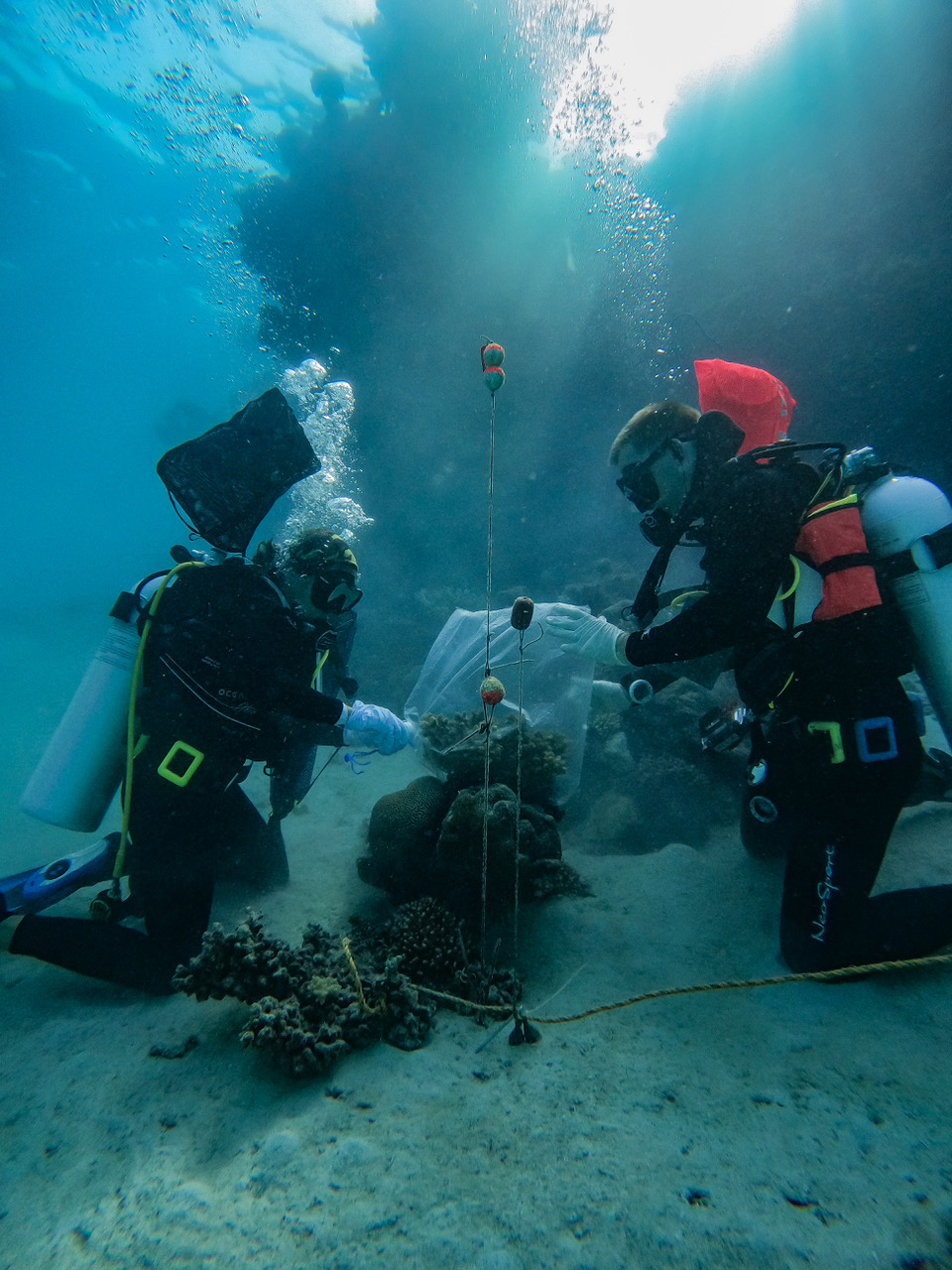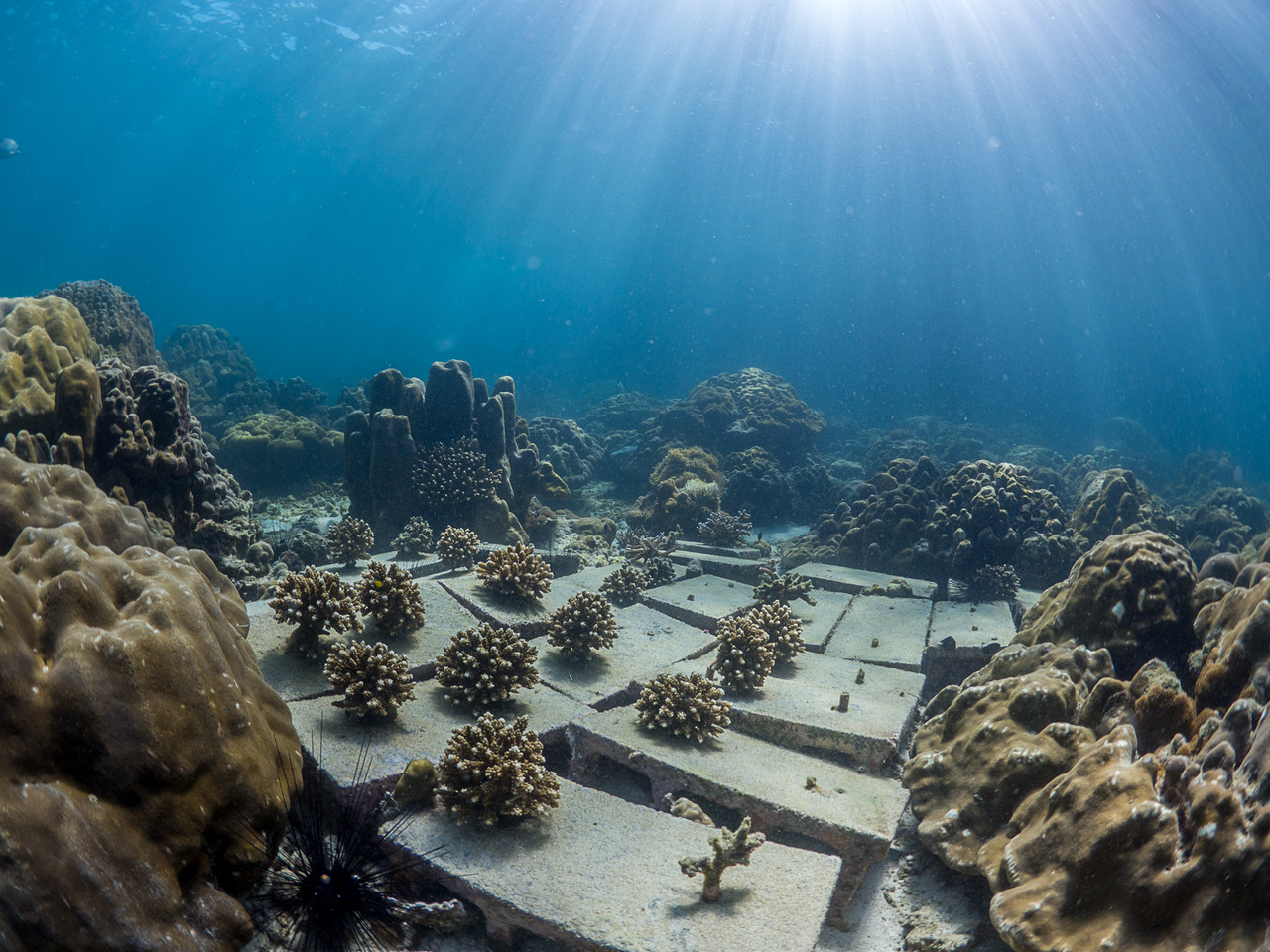
Coral restoration by means of microbial therapy. In the picture, Dr. Raquel Peixoto (KAUST) and Dr. Christian Voolstra (Uni Konstanz) apply a probiotic cocktail consisting of beneficial bacteria isolated from healthy and resilient coral colonies of the same species to a coral colony to increase its stress tolerance. Photo credit: Helena Villela.
Coral reefs are rapidly degrading all over the world due to climate change and human activity. This phenomenon has dire consequences on the livelihoods of almost one billion people who directly depend on the ecosystem services delivered through healthy tropical reefs. Based on current projections, and without active intervention, coral reefs may become extinct by the year 2050.
To improve the prospect of rescuing corals, pioneer researchers from King Abdullah University of Science and Technology (KAUST) collaborated with other distinguished researchers from around the world to propose a nature-based adaptive approach to boost coral restoration. The review, published in Nature Reviews in Earth & Environment on 12 October 2021, proposes intervention strategies to counter the doomed fate of corals.
The coral holobiont
Corals, which build the foundation of coral reef ecosystems, are hosts to many microbes, including symbiotic photosynthetic microalgae. The coral host and its associated microbes form a metaorganism, also called the coral holobiont.
Unfortunately, climate change and consequent higher seawater temperatures force corals to expel their symbiotic microalgae. With the symbionts gone, the corals lose their primary source of nutrition, which leads to starvation, reduced fertility and growth, and often results in widespread coral bleaching and mortality.
A shared concern among scientists is that the rate of environmental change could outpace the ability of coral holobionts to adapt to the rapidly changing environment. Consequently, biological, ecological and socio-economic adaptations are critical approaches that need to work hand-in-hand to preserve reefs and delay coral populations' global loss.
In the outlined roadmap to improve coral reef restoration, a particular emphasis is made on defining specific components of the coral holobiont that can be enhanced to maximize the natural adaptive capacity of corals to survive climate change. It also indicates particular approaches that should be applied to protect each reef in a customized way by considering their state of degradation, location, and other particular traits.

Coral restoration by means of nurseries-based coral growing. Coral larvae are allowed to settle on an artificial structure or substrate to grow to a certain size in nurseries in a benign environment, after which they can be transplanted to the reef site targeted for restoration. Photo credit: Anna Roik
Extending the natural adaptivity
"The research follows the premise "nature does it best," and emphasizes extending the natural adaptive capabilities of the holobiont to help corals survive, even considering the more extreme conditions projected under climate change scenarios." said Dr. Christian Voolstra, lead author of the paper, adjunct professor at KAUST and professor at the University of Konstanz.
Global coordination is crucial in this respect. Therefore, implementing an adaptive intervention framework tailored around nature-based solutions requires standardized methodology, safety assessments, and analytical routines for consistent and scalable measurements. "This was the focal point behind the importance of this research and the collaborative work that it implies," added Voolstra.
Meanwhile, understanding how corals function is fundamental to the success of any approach that exploits their natural capacity to adapt. Detailed knowledge on the long-term survivability of reefs and a deeper understanding of the biotic (i.e., different mechanisms of holobiont resistance and resilience) and abiotic factors (i.e., environmental conditions and triggers for coral damage) that underlie coral stress tolerance is essential.
"Once these aspects are clarified, the same mechanisms that have naturally evolved to help coral survive stress can be manipulated and enhanced to improve coral resilience to climate change," highlighted Manuel Aranda, last author of the paper and associate professor at KAUST.
Success rate and risk-benefit assessment
Success of these interventions and any potential associated risks will vary depending on the approach and the particular environment in which it is applied. It will also depend on how urgent these interventions are, depending on the level of degradation. For this reason, adaptive interventions are most suited for risk-benefit assessment. Environmental hardening, i.e. the exposure of coral larvae to stressful conditions for priming in a hostile environment for example, possesses less risk, although with limited longer-term resilience gains than selective breeding approaches, i.e. the human-assisted crossing of stress tolerant genotypes, which directly interfere with coral population structures.
But as the science of coral reef interventions is budding, it is essential to assess the potential treatments and approaches for their longer-term benefits and risks to determine their efficacy, applicability, and the best way to combine or integrate them with other techniques. "Any intervention approach will also need to be weighed against the consequences of inaction," said Raquel Peixoto, contributing author to the paper and associate professor of marine science at KAUST.
KAUST researchers shared efforts with other world research leaders to implement emergency intervention strategies to save the coral reefs that are rapidly degrading worldwide due to climate change and human activity. Their aim is to extend the natural adaptive capacity of the coral animals and their microbes to help them cope with climate change and save coral reef ecosystem from disappearance.






